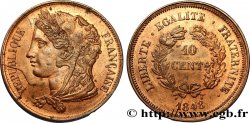fme_446496 - II REPUBLIC Médaille de la Garde Nationale de Rouen
Not available.
Item sold on our e-shop (2018)
Price : 90.00 €
Item sold on our e-shop (2018)
Price : 90.00 €
Type : Médaille de la Garde Nationale de Rouen
Date: 1848
Mint name / Town : 76 - Rouen
Metal : copper
Diameter : 41,2 mm
Orientation dies : 12 h.
Engraver DEPAULIS Alexis-Joseph (1790-1867)
Weight : 34,9 g.
Edge : lisse + main CUIVRE
Coments on the condition:
Superbe médaille avec son épaisse patin brune
Obverse
Obverse legend : XXIII. XXIV. XXV. XXVI. JUIN MDCCCXLVIII.
Obverse description : Couronne.
Reverse
Reverse legend : A / SES VOLONTAIRES / PARTIS POUR DÉFENDRE / A PARIS / L’ORDRE ET LES LOIS / LA VILLE DE ROUEN / RECONNAISSANTE.
Reverse description : Légende sur 7 lignes.
Commentary
Cette médaille presque neuve ne porte aucun nom au centre du droit, comme c’est parfois le cas, gravé en creux..








 Report a mistake
Report a mistake Print the page
Print the page Share my selection
Share my selection Ask a question
Ask a question Consign / sell
Consign / sell
 Full data
Full data



